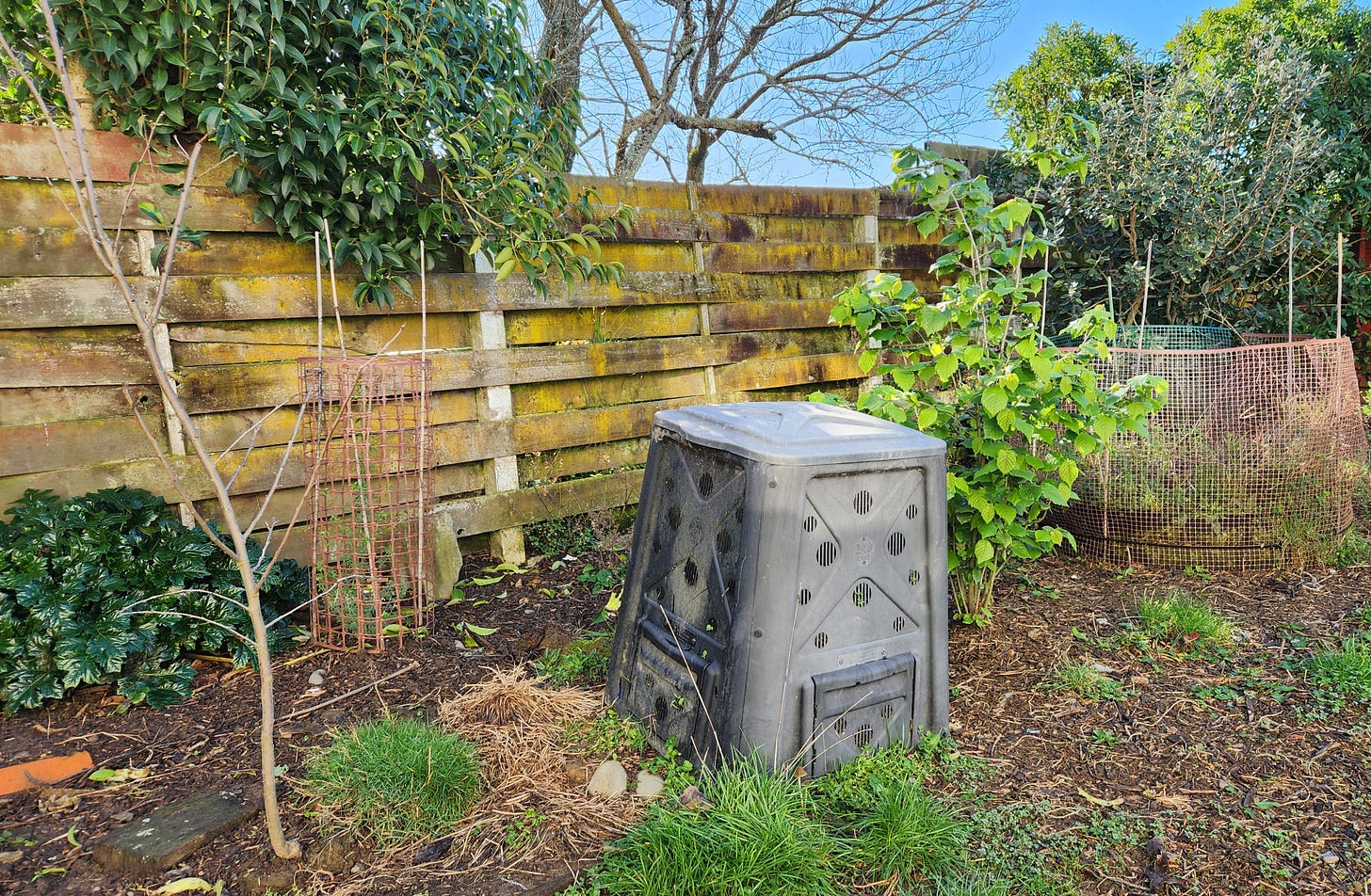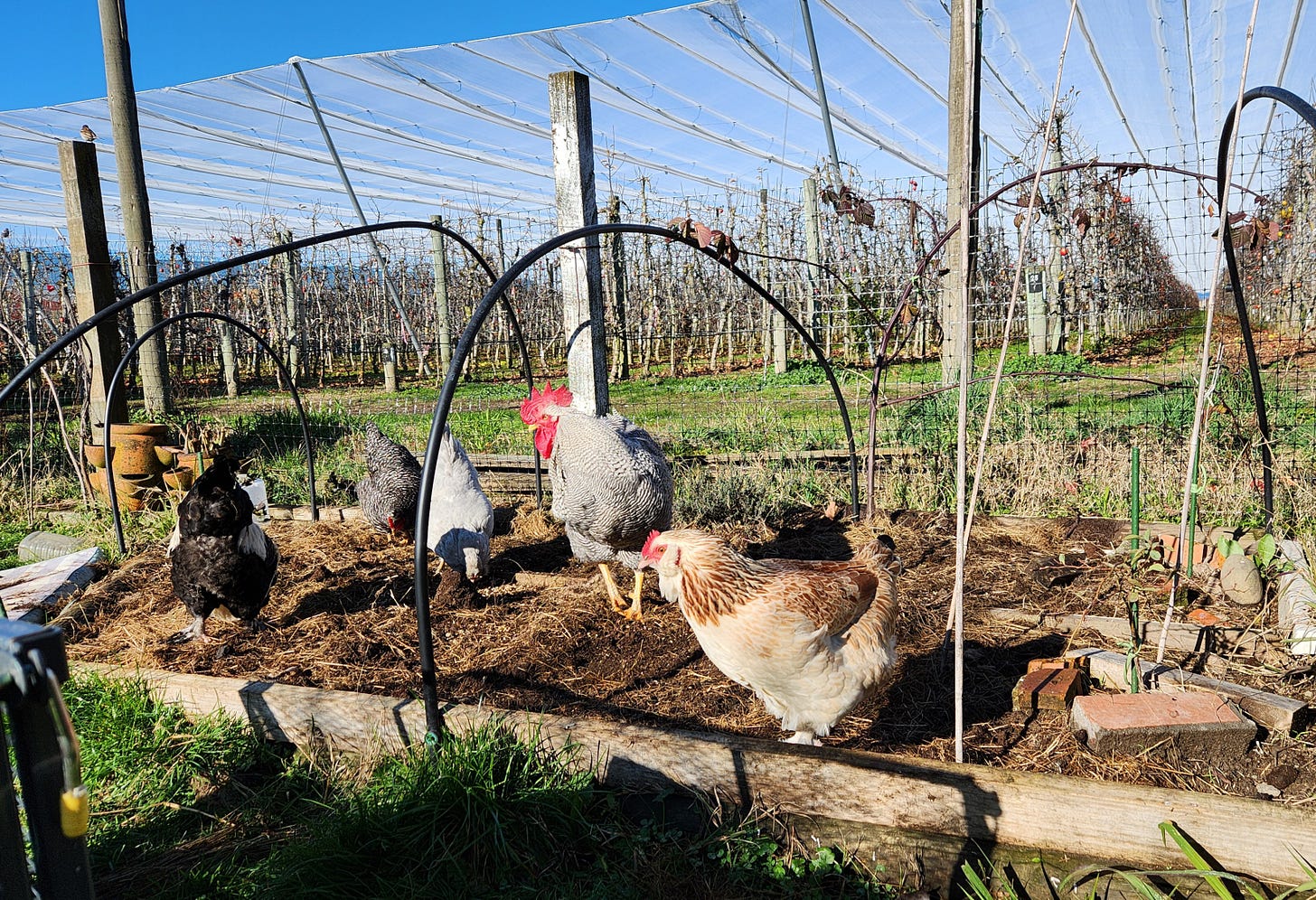Powering the Farm with Manure, Like it's 1000CE
Using horse manure, composting worms, and my willing chicken workforce to cycle nutrients in my vegetable gardens
For the video version of this essay, jump to the end.
Once upon a time, not so very long ago (120 years, give or take), every farm was powered by animal (and people) manure. It is more correct to say that farming was powered by sunlight. Plants convert sunlight into energy that animals and people can consume, and then we poop out to return fertility to the soil for the process to begin again. The power of the sun aside, today I am talking about using manure, specifically horse and chicken manure, to provide the fertility foundation of small-scale, intensive farming operations.
I haven’t got a large amount of land available for growing food. Because of this limitation I grow pretty intensively in the garden beds I have. This can put a fair bit of stress on soil nutrient availability for growing plants. To avoid having to use synthetic fertilizers to prop up the high expectations on my gardens, I use a manure-based fertility strategy driven by horse manure, composting worms, and chickens. This system works fine if you haven’t got chickens, you just have to do the work yourself instead of delegating it to the flock.
I happen to live across the road from an equestrian park. The sort of place where people come to ride their horses, where shows are held, and where the local pony club meets each month. Horses poop a lot and this poop is collected by their handlers and put into designated manure piles. I take my garden cart and mosey over, fill it up from the manure piles and bring it back to my property. It’s a pretty decent workout on the way back! The beauty of this is the manure tends to be at different rates of decomposition so I can pick and choose what I shovel into the cart depending on my needs. The great thing about horse manure is it is pretty easy to get even if you don’t live across the road from an equestrian park. Horses are companion animals and are usually kept near urban centers. You’re highly likely to be able to find a stable facility close by that will be more than happy to give you their horse manure.
Horses are very inefficient digesters. They don’t have multiple stomachs like ruminant animals do. This means that what comes out the back end of a horse is essentially just chewed-up grass. It has excellent feed value for composting worms. It has a near-perfect carbon to nitrogen ratio for hot-composting, meaning if all you want to do with it is turn it to compost you can just make a big pile and walk away. It will compost itself just fine. I like to speed the process along so I engage the assistance of composting worms and chickens.
I collect manure that is already well composted to spread directly on my gardens as mulch. This is something that I do every year in the late autumn and over the winter. I also use chicken-run compost for the same purpose, but I tend to reserve the chicken compost for making seed raising mix and potting soil in the first instance. I dump a pile of compost or manure in the middle of the garden and the chickens come and spread it all for me. They also gobble up weed seeds and any germinating seedlings. Chickens are my cultivators, they provide me with a phenomenal weed-free, fine-tilth seed-bed every spring.
I also collect manure that is more fresh, and this is what forms the basis of my worm farms. I have free-range worm farms, meaning that the worms can enter and leave the bins at will through the bottom and in some cases through the sides. I just use regular plastic compost bins for this. If you have an enclosed system where the worms can’t escape, it’s very important to let the manure go through its hot cycle first or your worms will not be happy! In a free-range system they can move to areas that have the right temperature, or leave the bin entirely until the manure cools down.
The worms multiply rapidly in these manure bins. I keep topping up the bins with fresh manure. I place each bin strategically, usually between newly planted trees, or in an area where I plan to cultivate garden for a few years. I do have one bin that permanently stays by the back door off the kitchen. This bin takes the occasional potato peel, and it is the bin that serves as my nursey for populating any other bins I set up. Each bin stays for about a year in its place. I then move it to a new location. When I move it, I take a bucket of material from the top (which will be filled with worms) and use this to seed the set up in the next location. I shove the pile over so I can access the worm castings that will have concentrated at the bottom. These I screen and store in old feed sacks to use in my seed raising mixes. The chickens then move in and spread the pile, gobbling up worms as they go. Well this isn’t entirely accurate, I fend them off until I’m done with the worm castings and then they have free rein. It’s one way to ensure the castings are entirely worms free!

For those people who (sensibly) keep their chickens in a run, the worm bin can be set up right inside the chicken run. So long as the chickens can’t get inside it, the worms can get along doing their job. You can then allow the chickens to access the pile. They will have a grand time spreading and turning it for you, with the only job left for you to do being raking it back up into a pile again. This speeds up how quickly the compost will finish, although your worm populations will take a major hit! I have bumper populations of worms in some of my bins, and these can be scooped out and fed to the chickens as a high protein feed. I don’t tend to do this as my flock gets access to plenty of bugs anyway, but it’s another benefit to the system.
You’ll know when the compost is finished because it will look like rich, brown soil. It’s soft and fluffy and smells like earth. Something about horse manure compost appeals to me more than any other compost. My chicken run compost is really great stuff and the plants love it. It is also dark and soil-like, but it isn’t fluffy and soft like the horse compost. The chicken compost looks and handles just like any other compost that has been made with a high percentage of wood-chip. Worm-finished horse manure compost is something else entirely. You have to put your hands in it to really understand!
Horse manure is a good source of nitrogen, phosphorus and potassium. It is important to note that the potassium level is quite high compared to the nitrogen and phosphorus. This means it is possible to mess up the nutrient balance in your soils if you only use manure and don’t grow things that are hungry for all that potassium. This does take years to become an issue, and nature tends to have ways to mitigate issues, so I wouldn’t worry about it too much if you’re content to let you garden grow the way it wants to. Horse manure also has calcium, magnesium and sodium. The sodium can become an issue if you don’t get good amounts of rain to flush through your soil. I don’t recommend using high levels of manure-based compost if you are growing in a high tunnel with drip irrigation. I suspect that manure from horses also contains a wide range of micronutrients because horse owners tend to feed their horses very well. It is common practice to add vitamin and mineral supplements to daily feed. This is good news for gardeners! We get to benefit from all the fertility coming from the grass, grain and pricey nutritional supplements that are fed to these animals.
Earthworms love horse manure just as much as composting worms do. A thick layer of horse manure mulch will have all the worms partying in your garden. I turn one garden bed per year into a worm bed for about 6 months. The plants I grow in it afterwards are very happy plants. I don’t do anything special to make this worm bed. I just pile on lots of manure with some composting worms, put a shade cloth cover on it to keep the chickens out and walk away. If it’s particularly dry weather I will water it when I water the gardens. This is probably the easiest method for using the manure you can get!
Gardens thrive when they get the things that they need in the ways they expect to get them. Good gardening is like good cooking. Cooking from scratch, using simple ingredients, tastes much better and is much better for you than opening up a bag of processed ‘food’. It’s the same in the garden. Letting your garden thrive by supporting soil health and biology will give you a much healthier garden than opening up a bag of processed plant food can ever achieve.
This video goes over the benefits of horse manure and my system for using it:






I grow 80% of my food on my mini farm and all the fertility comes from the chicken coop, compost and seaweed :) Great Article :)
Fascinating. I do mean that. Who would have thought manure could do all that! Our daughter had a horse for a few years so I can attest to the hard work it is to shovel and move horse dung. Definitely a work out! I am learning through your posts to see the collaboration and connection between the animals, earth and custodians of the plot of land. Chickens and worms - an industrious combination. Thank you again for another great insight into your world.